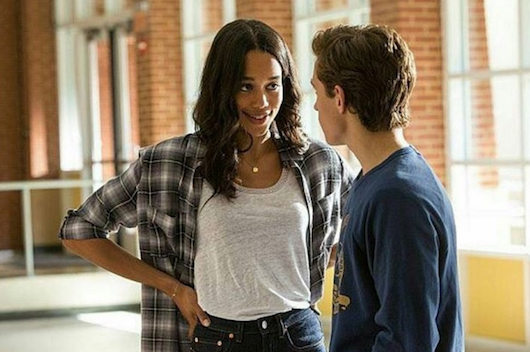 FILM
FILM In Which Maybe Andrew Garfield Should Have Been The Last
 Monday, July 10, 2017 at 10:00AM
Monday, July 10, 2017 at 10:00AM 
Kids
by ETHAN PETERSON
Spider-Man: Homecoming
dir. Jon Watts
133 minutes
 Peter Parker (Tom Holland) looks really old for high school, let alone to be a sophomore. Fortunately, his love interest in Spider-Man: Homecoming, the most "How do you do, fellow kids?" of perhaps any movie, is Liz (Laura Harrier) who is an absolutely mind-boggling 27 years old. At least director Jon Watts gives us the courtesy of never having Liz and Peter touch at all, possibly because on some level that would be child endangerment. When Peter finds out that Liz's father is arms dealer Adrian Toomes (Michael Keaton), he leaves a dance they were scheduled to attend and goes off to kill her daddy. This is a very confusing movie, even more confusing than Inception or Cars 3. Fortunately I am here to break down everything that happened for you, so you can sit back and marvel at how Robert Downey Jr. gets paid for acting.
Peter Parker (Tom Holland) looks really old for high school, let alone to be a sophomore. Fortunately, his love interest in Spider-Man: Homecoming, the most "How do you do, fellow kids?" of perhaps any movie, is Liz (Laura Harrier) who is an absolutely mind-boggling 27 years old. At least director Jon Watts gives us the courtesy of never having Liz and Peter touch at all, possibly because on some level that would be child endangerment. When Peter finds out that Liz's father is arms dealer Adrian Toomes (Michael Keaton), he leaves a dance they were scheduled to attend and goes off to kill her daddy. This is a very confusing movie, even more confusing than Inception or Cars 3. Fortunately I am here to break down everything that happened for you, so you can sit back and marvel at how Robert Downey Jr. gets paid for acting.

Let me switch the discussion to a character called MJ (Zendaya Coleman), a classmate of Peter Parker's. MJ is one of Peter's two friends, because good-looking white guys whose physiques resemble professional wrestlers are regularly relegated to being bullied by Latinos. In one important scene, MJ is reading W. Somerset Maugham's Of Human Bondage, which is not only utter shit, but is completely unrelated to what MJ is actually interested in. Probably the filmmakers chose the novel because it appears by its title to be about social concerns, but it is actually about no such thing.
In one key scene, MJ is hanging around the Washington Monument. She refuses to go up its elevator system, claiming that she is choosing to do so because the structure was built by slaves. This is not even true, but it makes for a funny line. The scene is really notable because it is the longest sentence she is allowed to utter in Spider-Man: Homecoming. She never addresses Peter Parker directly, speaking to him only as a unit with his Filipino friend, Ned Leeds (Jacob Batalon), with whom Parker shares his important secret.

Not content with one Mary Sue in this deeply misguided portrait of Queens, NY, which looks like a lot more like Beverly Hills, Liz appears one day in the hall. Although 27 and the tallest student in this high school, she is still the captain of the school's science team, and she clearly has a good head on her shoulders. Despite this, Peter never confides anything of what he discovers about her father to her, or asks for her advice. She is just a girl in a bathing suit, and Watts makes sure to squeeze in a scene where we see her sashay down a hallway to the pool in her one piece. Later, Peter observes her in the water from the hotel's roof.
Her father's crime is this: he discovers some alien technology left over from the unsuccesful Chitauri invasion of New York. He decides to repurpose what he finds as weapons, and he sells them to whoever wants them. Perhaps he does not vet his clients very closely, since one of them, played by Donald Glover, appears to be a ne'er do well of some kind. Others use the weapons to rob an ATM, where Parker discovers them.

Although the weapons are dangerous, they are most notable for being very effective in robberies. In their lethality they are no more special than munitions and firearms widely available today. To purchase such things for small crimes or acts of violence would be silly; they would only be useful to cut into a bank's vault and steal what was in there. Such money is insured, and anyway the organizations that hold it are not really in need of protection by a high-schooler.
Theft is a disturbing crime, and the deprivation of property is awful. However, Peter Parker is the one who deprives Toomes not only of his property, but his livelihood as well. It is not even wholly clear what Toomes did that is prosecutable, let alone worthy of being killed, which he thankfully is not in this movie. Combining this debatable criminality with the fact that Peter maintains a vague romantic interest in the man's daughter, and you have a deeply intriguing moral dilemma.

Instead, Spider-Man: Homecoming elides over this issue rather quickly. Parker causes hundreds of thousands of dollars in damage to city and private property trying to prevent the sale of a few guns. (This is never mentioned because it is the central and only theme of Avengers: Age of Ultron.) The most amusing of these events is when he destroys the Staten Island Ferry for some reason, endangering over 100 lives before Tony Stark (Robert Downey Jr) shows up and saves the day.
 Downey Jr. looks very old at this point, and is wisely no longer interested in portraying this character. Not coincidentally, no one is very interested in writing for it either, and the ostensible "comedy" in Spider-Man: Homecoming could not fall more flat. Downey Jr. even looks weirdly upset at points, and replacing him for the scenes they did not want to pay him for is his assistant, Happy (Jon Favreau), who is actually a good performer but never establishes any kind of deeper relationship with Peter.
Downey Jr. looks very old at this point, and is wisely no longer interested in portraying this character. Not coincidentally, no one is very interested in writing for it either, and the ostensible "comedy" in Spider-Man: Homecoming could not fall more flat. Downey Jr. even looks weirdly upset at points, and replacing him for the scenes they did not want to pay him for is his assistant, Happy (Jon Favreau), who is actually a good performer but never establishes any kind of deeper relationship with Peter.
Sam Raimi's Spiderman films struck a very weird tone and were the ultimate seed for the destruction of the character, since ultimately Parker became a parody of himself permanently ensconced in childhood. Despite the horror that was Spiderman 3, at least Parker had relationships with people and there were those in his life that he truly cared about, that he lived for. The death of his uncle motivated his desire to save innocents, and finding a woman with whom he could share everything was on some level his basic reason to continue living.
This Peter Parker is actually a sociopath in the making. He has one person he sort of cares about, his Aunt May (Marisa Tomei), who he treats like complete shit. He can barely even listen to what she is saying during the one dinner they have in Spider-Man: Homecoming, which occurs at a Thai restaurant and is merely a pretext for an Asian waiter to admire May. The conflict between Aunt May and Tony Stark really worked in Captain America: Civil War, so of course there is none of that here. When she finds out that Peter skipped out on a school trip and was rewarded with detention for cutting class, May's response is to kiss him on the head and close the door to his room.

On some level, a movie has to be about something. It can't just be an origin story for Parker's participation in the next Avengers movies. Now that Joss Whedon has switched over to DC for Justice League and Batgirl, Kevin Feige has a group of directors that are passable technicians. Spider-Man: Homecoming's action is rather pedestrian compared to what the brothers Russo are planning to offer, and the writing is nowhere close to what Whedon was able to manage. It's fine to barrel through various plots that were offered in the comics decades ago, since they will be completely fresh to the fellow kids, but is the plan to strip them of artistic integrity completely as well? At least James Gunn's movies have a story: the disastrously dull Spider-Man Homecoming cannot even manage that.
Ethan Peterson is the reviews editor of This Recording.














































